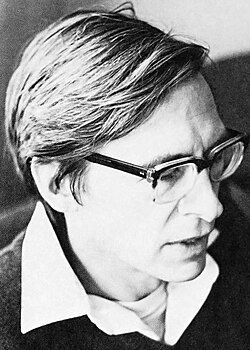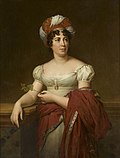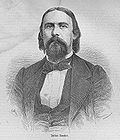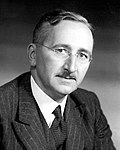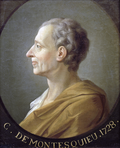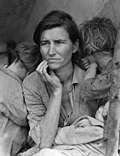
Back بوابة:ليبرالية Arabic Portal:Liberalizm Azerbaijani Πύλη:Φιλελευθερισμός Greek Portail:Libéralisme French Портал:Либерализм Russian ද්වාරය:ලිබරල්වාදය Singhalese Portal:Liberalizm Turkish Portal:自由主义 Chinese
The Liberalism portal
Liberalism is a political and moral philosophy based on the rights of the individual, liberty, consent of the governed, political equality, the right to private property, and equality before the law. Liberals espouse various and often mutually conflicting views depending on their understanding of these principles but generally support private property, market economies, individual rights (including civil rights and human rights), liberal democracy, secularism, rule of law, economic and political freedom, freedom of speech, freedom of the press, freedom of assembly, and freedom of religion. Liberalism is frequently cited as the dominant ideology of modern history.
Liberalism became a distinct movement in the Age of Enlightenment, gaining popularity among Western philosophers and economists. Liberalism sought to replace the norms of hereditary privilege, state religion, absolute monarchy, the divine right of kings and traditional conservatism with representative democracy, rule of law, and equality under the law. Liberals also ended mercantilist policies, royal monopolies, and other trade barriers, instead promoting free trade and marketization. The philosopher John Locke is often credited with founding liberalism as a distinct tradition based on the social contract, arguing that each man has a natural right to life, liberty and property, and governments must not violate these rights. While the British liberal tradition emphasized expanding democracy, French liberalism emphasized rejecting authoritarianism and is linked to nation-building. (Full article...)
Selected article -
Right-libertarianism, also known as libertarian capitalism, or right-wing libertarianism, is a libertarian political philosophy that supports capitalist property rights and market distribution of natural resources. The term right-libertarianism is used to distinguish this class of views on the nature of property and capital from left-libertarianism, a variant of libertarianism that combines self-ownership with an egalitarian approach to property and income. In contrast to socialist libertarianism, right-libertarianism supports free-market capitalism. Like most forms of libertarianism, it supports civil liberties, especially natural law, negative rights, the non-aggression principle, and a significant transformation of the modern welfare state.
Right-libertarian political thought is characterized by the strict priority given to liberty, with the need to maximize the realm of individual freedom and minimize the scope of public authority. Right-libertarians typically see the state as the principal threat to liberty. This anti-statism differs from anarchist doctrines in that it is based upon strong individualism that places less emphasis on human sociability or cooperation. Right-libertarian philosophy is also rooted in the ideas of individual rights and laissez-faire economics. The right-libertarian theory of individual rights generally follows the homestead principle and the labor theory of property, stressing self-ownership and that people have an absolute right to the property that their labor produces. Economically, right-libertarians make no distinction between capitalism and free markets and view any attempt to dictate the market process as counterproductive, emphasizing the mechanisms and self-regulating nature of the market whilst portraying government intervention and attempts to redistribute wealth as invariably unnecessary and counter-productive. Although all right-libertarians oppose government intervention, there is a division between anarcho-capitalists, who view the state as an unnecessary evil and want property rights protected without statutory law through market-generated tort, contract and property law; and minarchists, who support the need for a minimal state, often referred to as a night-watchman state, to provide its citizens with courts, military, and police. (Full article...)
Selected biography -
John Bordley Rawls (/rɔːlz/; February 21, 1921 – November 24, 2002) was an American moral, legal and political philosopher in the modern liberal tradition. Rawls has been described as one of the most influential political philosophers of the 20th century.
In 1990, Will Kymlicka wrote in his introduction to the field that "it is generally accepted that the recent rebirth of normative political philosophy began with the publication of John Rawls's A Theory of Justice in 1971". Rawls's theory of "justice as fairness" recommends equal basic liberties, equality of opportunity, and facilitating the maximum benefit to the least advantaged members of society in any case where inequalities may occur. Rawls's argument for these principles of social justice uses a thought experiment called the "original position", in which people deliberately select what kind of society they would choose to live in if they did not know which social position they would personally occupy. In his later work Political Liberalism (1993), Rawls turned to the question of how political power could be made legitimate given reasonable disagreement about the nature of the good life. (Full article...)
List of selected biographies
|
|---|
Selected quote
General images
Subcategories
Related portals
WikiProjects
Topics
Recognized content
Associated Wikimedia
The following Wikimedia Foundation sister projects provide more on this subject:
-
Commons
Free media repository -
Wikibooks
Free textbooks and manuals -
Wikidata
Free knowledge base -
Wikinews
Free-content news -
Wikiquote
Collection of quotations -
Wikisource
Free-content library -
Wikiversity
Free learning tools -
Wiktionary
Dictionary and thesaurus
